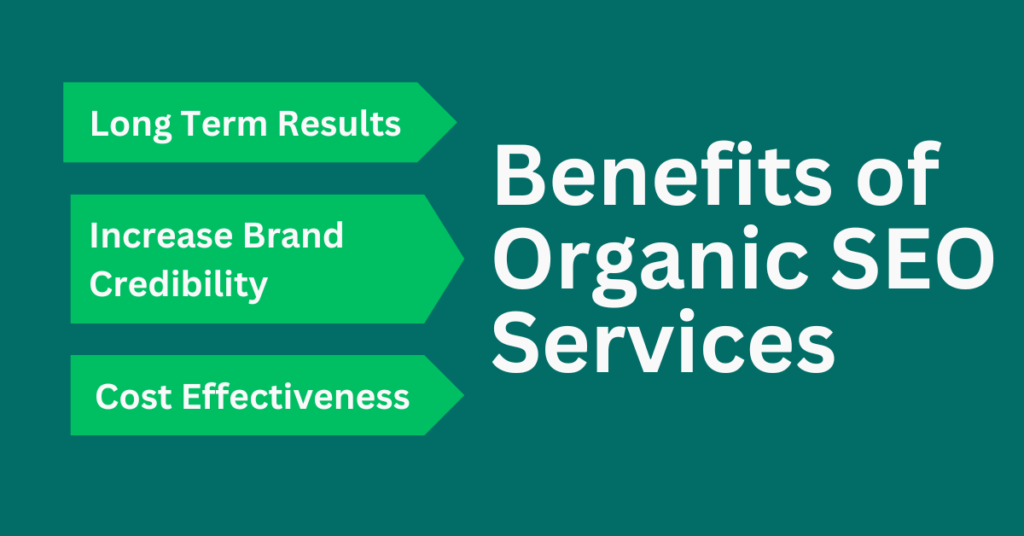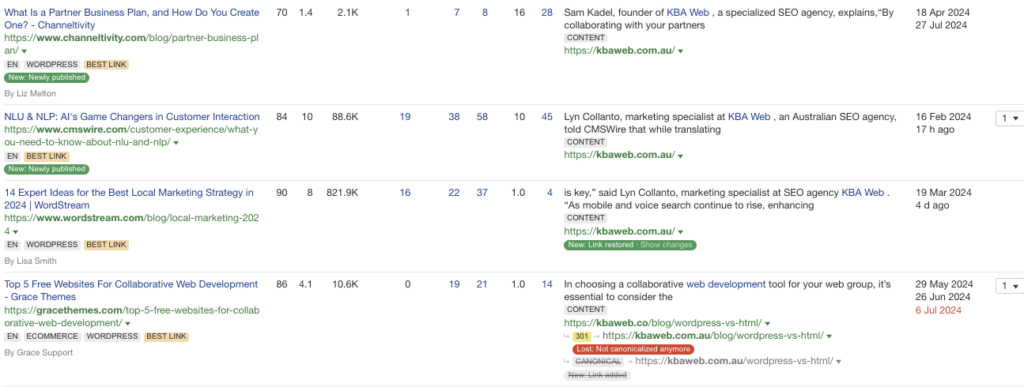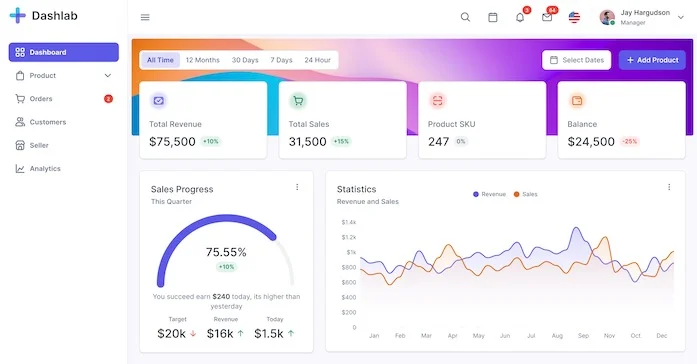Organic SEO service success lies in your ability to stand out from the online crowd. This is the most powerful way to boost your online business’s visibility and attract more potential customers. With a focus on natural, sustainable strategies, organic SEO services help you reach the top search engine rankings and establish a strong online branding that lasts.
You might be wondering how organic SEO can benefit your business in the long run. Well, we’re here to guide you through the ins and outs of this essential digital marketing approach. From understanding search engine algorithms to crafting compelling content strategies, we’ll explore the key elements that make organic SEO so effective. We’ll also tackle link-building techniques, measurement tools, and how partnering with an organic SEO company or consultant can lead to lasting growth for your online presence.
What is organic SEO?
Organic SEO services are all about enhancing your website’s visibility in search engines’ unpaid results. Unlike paid advertising, it’s a testament to your website’s intrinsic value, relevance, and authority. When you use organic SEO, you’re focusing on natural, sustainable strategies to climb the search engine rankings and establish a strong online presence that lasts.
The importance of organic SEO
You might be wondering why organic SEO is so crucial for your business. Well, there are several compelling reasons:
- Cost-Effectiveness
One of the most compelling reasons to embrace organic SEO is its cost-effectiveness. While it might seem like a hefty investment initially, this upfront cost pays off in the long run. Compared to paid advertising, organic SEO offers a highly cost-effective marketing strategy.
- Enhanced Credibility
When you rank highly in organic search results, it signals to users that your site is a reputable and authoritative source. This enhances trust, as users tend to perceive organic search results as more authentic than paid advertisements.
- Improved User Experience
Organic SEO often involves improving site usability, making it more navigable and user-friendly. By focusing on factors like fast load times, mobile optimisation, and intuitive navigation, you’re not just optimising for search engines—you’re also creating a more enjoyable and efficient experience for your users.
- Targeted Traffic
By leveraging SEO techniques, you can attract organic traffic from search engines, resulting in increased visibility and valuable user engagement. This targeted approach helps you reach users who are actively searching for products or services like yours.

The Benefits of Organic SEO Services
When you’re looking to boost your online presence, organic SEO services offer a wealth of advantages. Let’s explore how these services can benefit your business in the long run.
Long-term Results
Organic SEO is an investment that continues to provide benefits over time. Unlike paid advertising, where results stop when you stop paying, SEO builds up your site’s authority, content, and visibility in search engines sustainably. As you keep up with your SEO efforts, the content you create will continue to bring in traffic long after you publish it. This compounding effect means that over time, you’ll see exponential growth in your online presence.
Think of SEO as planting seeds that grow into a flourishing garden. At first, you might see minimal results, but as your efforts compound, you’ll start to see substantial gains. This snowball effect can lead to:
- Increased visibility in search results
- More organic traffic to your website
- Higher rankings for new content as your site authority grows
Cost-effectiveness
One of the most compelling reasons to embrace organic SEO is its cost-effectiveness. While you might think theres a significant investment initially, its long-term benefits far outweigh the upfront costs. Here’s why:
- Lower cost per lead: Organic search results often deliver clicks at a fraction of the cost of paid search ads.
- Sustainable traffic: Once you achieve high rankings, you continue to receive traffic without ongoing ad spend.
- Scalability: As your organic visibility improves, you can reach more potential customers without proportionally increasing your budget.
Focusing on this strategy, you put yourself into a more sustainable and budget-friendly marketing strategy for long term result.
Increase Brand Credibility
Organic SEO has a powerful impact on your brand’s credibility and trustworthiness. When your website ranks highly in organic search results, these signals to users that your website is a reputable and authoritative source. This enhanced credibility can lead to:
- Increased trust from potential customers
- Higher click-through rates in search results
- More engagement with your content
Your consistent SEO efforts help build a comprehensive and consistent online brand presence. This consistency is key – Lucid study research shows that presenting your brand consistently across all platforms can increase revenue by 23%.
You can boost your brand’s credibility through SEO:
- Focus on creating expert-level, authoritative, and trustworthy content (EAT)
- Cultivate authoritative backlinks from reputable sources in your industry.
- Implement schema markup to help search engines understand your content better.
- Encourage and manage customer reviews across various platforms.
By investing in organic SEO services, you’re not just improving your search rankings; you’re building a strong, credible brand that resonates with your target audience. This approach sets the foundation for long-term success in the digital landscape, helping you attract high-quality leads and establish your business as a trusted authority in your field.
Key Elements of Effective Organic SEO
To boost your website’s visibility and climb the search engine rankings, you need to focus on three crucial aspects of organic SEO: on-page optimization, off-page optimization, and technical SEO. Let’s dive into each of these elements to help you understand how they work together to improve your online presence.
On-page Optimisation
On-page SEO is all about optimising the elements on your website that you have direct control over. Here’s what you need to focus on:
- Keywords: Start with thorough keyword research to identify the terms your audience uses to find information related to your niche. Use these keywords strategically throughout your content, including in titles, headings, and body text.
- Content Quality: Create high-quality, informative content that addresses your audience’s needs. Gone are the days of thin, keyword-stuffed articles. Search engines now prioritise well-written, valuable content that keeps users engaged.
- Headings and Meta Descriptions: Use clear, descriptive headings (H1, H2, H3) to structure your content and make it easily scannable. Craft compelling meta descriptions that entice users to click on your search result.
- Internal Linking: Use relevant anchor text to link to other pages on your site. This helps search engines understand your site structure and keeps users engaged longer.
Off-page Optimisation
Off-page SEO focuses on improving your website’s authority and credibility through external factors. Here are the key elements:
- Backlinks: Earn high-quality backlinks from reputable websites in your industry. These act as votes of confidence, telling search engines that your site is a valuable source of information.
- Social Signals: While not a direct ranking factor, a strong social media presence can increase your brand visibility and drive traffic to your site.
- Content Partnerships: Collaborate with other businesses or websites to create and promote content, tapping into new audiences and gaining valuable backlinks.
- Local SEO: If you have a physical location, optimise your Google Business Profile to improve your visibility in local search results and on Google Maps.

Technical SEO
Technical SEO ensures that search engines can crawl and index your site efficiently. Here are the key aspects to focus on:
- Site Speed
Optimise your website’s loading speed across all devices. A fast-loading site improves the user experience and is preferred by search engines.
- Mobile-Friendliness
Ensure your website is fully responsive and functions seamlessly on all devices, especially mobile phones and tablets.
- Site Structure
Create a clear, logical site structure with a well-organised hierarchy of pages. This helps search engine bots understand and index your content more effectively.
- XML Sitemap
Submit an XML sitemap to search engines to help them crawl and index your site more efficiently.
- Schema Markup
Implement structured data markup to help search engines better understand your content and display rich snippets in search results.
These key elements of organic SEO will help you improve your search engine rankings and drive more targeted traffic to your website.
Why Understanding Search Engine Algorithms is Crucial
To boost your website’s visibility and climb the search engine rankings, you need to grasp how search engine algorithms work. These crucial processes evaluate and reward websites that deliver high-quality content and real value to users. Let’s dive into the key aspects of search engine algorithms and how they impact your organic SEO efforts.
Google’s Ranking Factors
Google uses over 200 ranking factors in its algorithm to determine which websites appear at the top of search results. While it’s impossible to optimise for every single factor, focusing on the most important ones can significantly improve your search visibility. Here are some crucial ranking factors to consider:
Algorithm Updates
Google frequently updates its algorithms to improve the user experience and provide more accurate search results. In fact, Google releases between 500 – 600 updates every year. While most of these are minor tweaks, some can have a significant impact on your website’s performance.
Staying Compliant
To ensure your website remains in good standing with search engines, it’s crucial to stay compliant with their guidelines. Understanding search engine algorithms and staying in compliance is your key to positioning your website for long-term success in organic search results. Take note that the key to sustainable SEO is to focus on creating valuable content and providing an excellent user experience, rather than trying to game the system.
Content Strategy for Organic SEO
To boost your website’s visibility and climb the search engine rankings, you need a solid content strategy for organic SEO. This approach involves three key elements: keyword research, content creation, and content optimisation. Let’s dive into each of these components to help you create a winning strategy.
Keyword Research
Keyword research is the foundation of your organic SEO efforts. It’s the process of finding and analysing search terms that people enter into search engines. This valuable insight helps you understand what your target audience is looking for and how to create content that meets their needs.
To conduct effective keyword research:
- Use tools like SEMrush, Ahrefs, or Google’s Keyword Planner to identify relevant keywords for your business.
- Focus on long-tail keywords (three or more words), as they often have lower competition and higher conversion rates.
- Consider the search intent behind keywords (informational, transactional, or navigational) to create content that matches user needs.
- Don’t overlook low or zero-volume keywords, as they can often be valuable for targeting niche audiences.
Content Creation
Once you’ve identified your target keywords, it’s time to create high-quality content that satisfies both search engines and your audience. Remember, good content has the best chance of becoming viral content, which Google rewards heavily in its ranking algorithm.
To create effective content:
- Focus on solving problems or answering questions your audience has.
- Aim for longer content, with a minimum of 1300-1500 words for typical blog posts.
- Use a hub-and-spoke content strategy to build topical authority. Create clusters of content around main topics and link them to a central “hub” page.
- Incorporate multimedia elements like videos and images to make your content more engaging.
- Write descriptive and catchy titles that include your target keyword and stay under 60 characters.
Content Optimisation
Optimising your content is crucial for improving your organic search rankings. This involves strategically placing keywords and structuring your content for both search engines and users.
To optimise your content effectively:
- Include your target keyword in key places:
- Title tag
- URL slug (keep it short and use hyphens to separate words)
- Meta description (155–160 characters)
- H1 tag (main title)
- Throughout the content, including H2-H6 subheadings
- Image alt tags
- Use internal linking to connect related content and distribute link equity across your site.
- Add external links to authoritative sources to boost credibility.
- Optimise for featured snippets by directly answering common questions related to your keywords.
- Ensure your content is mobile-friendly and loads quickly.
- Use schema markup to help search engines better understand your content.
- Regularly update and refresh your content to maintain its relevance and improve its chances of ranking well.
These three key elements will help you develop a strong content strategy for organic SEO. Remember, the goal is to create valuable, informative content that satisfies both search engines and your target audience. With consistent effort and attention to detail, you’ll see improvements in your search engine rankings and organic traffic over time.
Link Building Strategies
The focus of link building has shifted from quantity to quality, recognising that a few high-value links can have a more significant impact than numerous low-quality ones. Some effective link-building strategies that can help boost your website’s visibility and credibility are as follows:.
Quality vs. Quantity
When it comes to backlinks, quality trumps quantity every time. Think of high-quality links as recommendations from respected experts in your field. These links carry more weight with search engines and can significantly improve your site’s authority and rankings.
To understand the difference, look out for this:
- Quality links come from reputable, relevant websites in your niche.
- They’re placed naturally within content that relates to your site.
- They use descriptive anchor text that accurately represents the linked page.
On the other hand, a high quantity of low-quality links can actually harm your site’s reputation. Search engines might view this as an attempt to manipulate rankings.
Natural Link Acquisition
Natural link acquisition is the process of earning backlinks organically, without any effort or using manipulative tactics. This kind of tactics takes time and effort, but the results are long-lasting and beneficial for your SEO.
Guest Posting
Guest posting remains an effective strategy for building high-quality backlinks and expanding your reach. By looking for reputable sites in your niche that accept guest posts and ensure they have good domain authority and an engaged audience.
Effective link building is an ongoing process that requires patience, consistency, and a commitment to creating valuable content that others want to share and reference.
Measuring Organic SEO Success
To gauge the effectiveness of your organic SEO efforts, you need to focus on key performance indicators (KPIs), utilise analytics tools, and create comprehensive reports. Here are some aspects to help you track and improve your SEO performance.
Key Performance Indicators
KPIs are crucial metrics that help you understand the success of your SEO strategy. Here are some essential KPIs to monitor:
- Organic Traffic: This metric shows the number of visitors coming to your site from unpaid search results. It’s a good indicator of how well your pages rank for relevant keywords and how many visits you’re getting that could potentially turn into customers.
- Conversions: Track the number of users who complete desired actions on your site, such as subscribing to a newsletter, downloading an ebook, or making a purchase. High conversions indicate that your pages are effective in turning visitors into leads or customers.
- Keyword Rankings: Monitor your website’s position on search engine results pages (SERPs) for specific keywords. Higher rankings typically lead to more traffic and better business results.
- Click-Through Rate (CTR): This percentage shows how many users click on your website from the SERP. A high CTR suggests that your titles and descriptions in SERPs are effective in attracting searchers’ attention.
- Bounce Rate: This metric shows the percentage of users who leave your site without engaging further. A low bounce rate indicates that your content is relevant and engaging for visitors.
- Organic Visibility: This KPI refers to how visible your brand is in organic search results. It’s directly related to your SEO efforts and overall business growth.
Analytics Tools
To effectively measure your SEO success, you’ll need to leverage various analytics tools so that you can effectively see and monitor your SEO efforts. Here are some popular options:
- Google Analytics
This free tool provides comprehensive insights into your website’s performance, including organic traffic, user behaviour, and conversion data.
- Google Search Console
Use this to monitor your site’s presence in Google search results, including impressions, clicks, and the average position for specific queries.
- SEMrush
This all-in-one SEO tool offers features for keyword research, competitor analysis, and rank tracking.
- Ahrefs
Similar to SEMrush, Ahrefs provides robust SEO analysis capabilities, including backlink monitoring and content performance tracking.
- Moz
Known for its Domain Authority metric, Moz offers a suite of SEO tools for keyword research, link building, and site audits.
Reporting
Regular reporting is crucial for understanding your SEO progress and communicating results to stakeholders. Aligning your reports with your client’s or company’s business goals ensures your SEO efforts are contributing to overall success. Provide recommendations based on your findings for next steps or areas to focus on in the coming period.
Consistently measuring these KPIs, utilising the right analytics tools, and creating insightful reports will help you have a clear picture of your organic SEO success. This approach allows you to make informed decisions, refine your strategies, and demonstrate the value of your SEO efforts to stakeholders.
Conclusion
Organic SEO services have a profound influence on long-term growth and online success. By focusing on natural, sustainable strategies, businesses can enhance online visibility, attract more potential customers, and establish a strong presence.
With patience and consistent effort, organic SEO services provide a solid foundation for lasting online success and sustainable business growth.
FAQs
What does organic SEO entail?
Organic SEO, often simply referred to as SEO, involves enhancing a website’s visibility in the unpaid search results of search engines. The aim is to elevate your webpages’ rankings in these unpaid results for search terms pertinent to your business, without paying for placements.
How can I enhance my SEO organically?
To improve your Google organic search ranking organically, consider these six tips:
- Optimise your website with relevant keywords.
- Build quality backlinks.
- Implement a responsive design to improve the user experience on all devices.
- Incorporate video content on your pages.
- Invest in professional copywriting.
- Engage in effective content marketing strategies.
Starting these practices can help you boost your organic search rankings effectively.
What can be expected as long-term results from SEO?
SEO is inherently a long-term marketing strategy. Typically, it might take anywhere from four to twelve months to begin seeing results, as reported by Search Engine Journal. The process involves building a solid audience and reputation, which naturally requires time. The more competitive your industry, the longer it might take to see significant outcomes.
Why is SEO considered a long-term strategy?
SEO implementation is a long-term strategy because it involves a sustained effort and financial capability to improve your website’s search engine rankings. Significant results from different SEO tactics, such as increased traffic and higher rankings, can often take several months to years to manifest, necessitating a well-thought-out, long-term approach.






